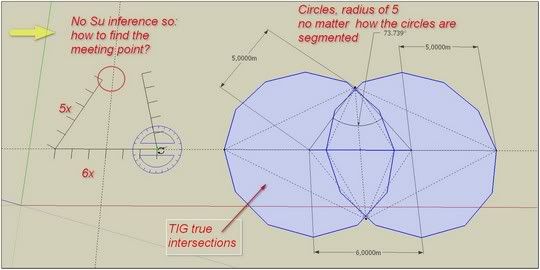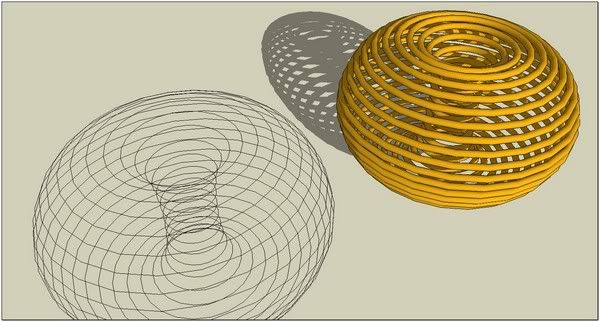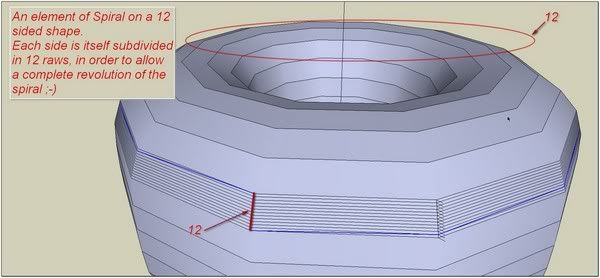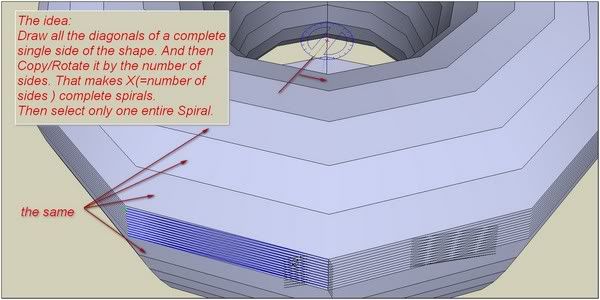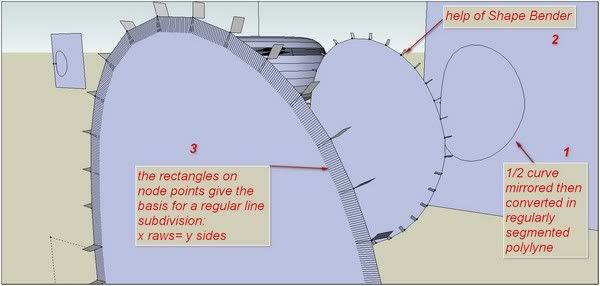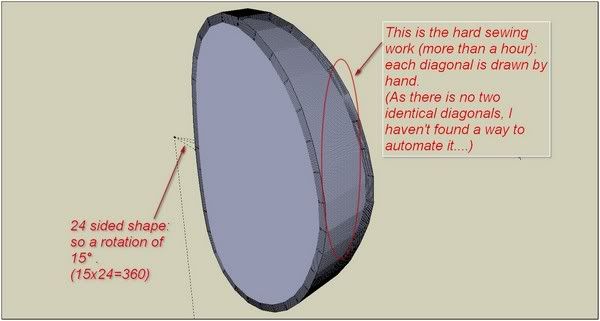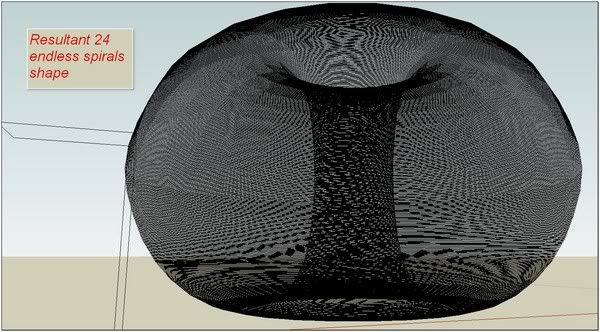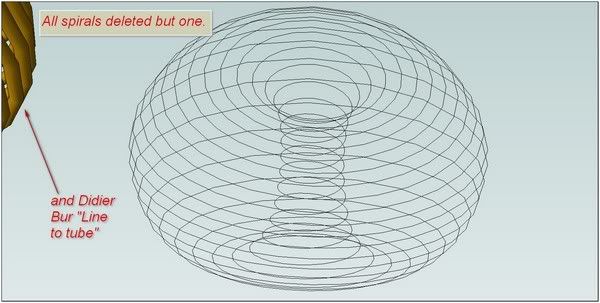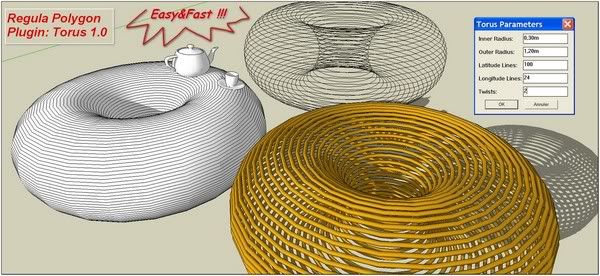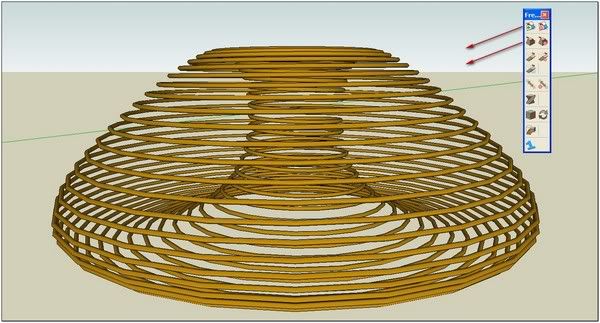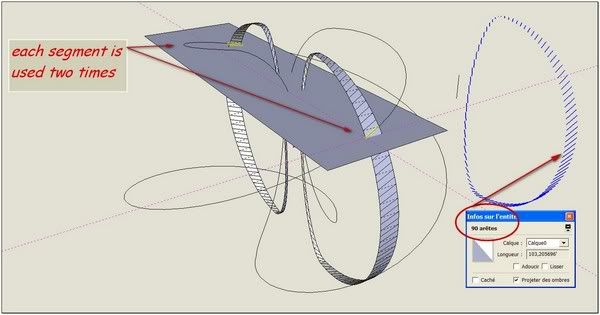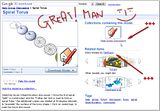An exercise: DRAWING A PARISIAN FENCE
-
I have succeeded to make my video "Trick 2" before to leave.

The first big problem was to draw "The Diamond" with the 6x and the two 5x lines . I have discovered with Taff and JeanLemire that Su suffers of a lack of inference and consequency we need a:
@jean lemire said:
Method to allow to rotate an edge around one end in order to bring the other end in contact with an other edge. This is something that the inference engine cannot do.
see: Rotating an edge to another edgeI bring here my own method using TIG_TrueTangents v1.9
The second big point was to manage curves of an exact length between two pointsSee Taff's close by close Solution. This is another very sensitive point where SU is in default.
I have taken great advantage of Fredo's Bend Tool set in FredoScale 2.0i
YouTube SketchUp_ParisianFence_Tricks2(sorry I couldn't be shorter )
)
[flash=640,505:3ig0nr8b]http://www.youtube.com/v/nobO28fyV-g[/flash:3ig0nr8b]
& TIG_Mirror 31
What Else?I havn't discovered what was the mistake Taff was talking about
@unknownuser said:I just discovered a spacing mistake I made in the top-rail/hoop area!

++simon
-
-
-
Dear Pilou,
I don't know how you do to deliver always those sensitive links



@unknownuser said:
Seems make an half bowl with an helix in 2 parts (vertical internal & external )deformed by the Fredo Scale can make the trick
please if you have time, try it and show us, each solution is a benefit for everybody in this place.
*s -
@unknownuser said:
those sensitive links

So you miss my final little try (crossing message, so I post there
Without Fredoscale, only Draw helix13 by Peter Brown, 4 parts as explain above, and rotate, Scale -1/ symetry
From the image above + Didier Bur line to cylinder
If it's not realy perfect spherical you can deform it
I have made a speedy test
(petit bricolage juste pour le fun
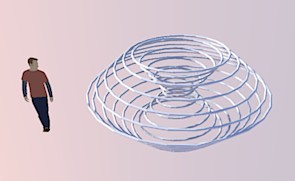
-
Seems make an half bowl with an helix in 2 parts (vertical internal & external )deformed by the Fredo Scale can make the trick

Then past a mirror oneAnother solution is maybe use a geometric formula

Somewhere in this incredible world
Or here in french
Edit: seems that is possible with the plug Draw helix 13

Just take same start/end radius between each parts
and make some vertical symetry and rotation
With training I believe that you can make that in one minute!
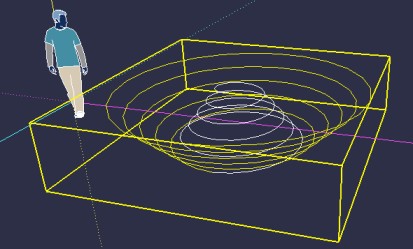
-
This attempt was a "proof of concept" model, to try out a technique I had in mind.
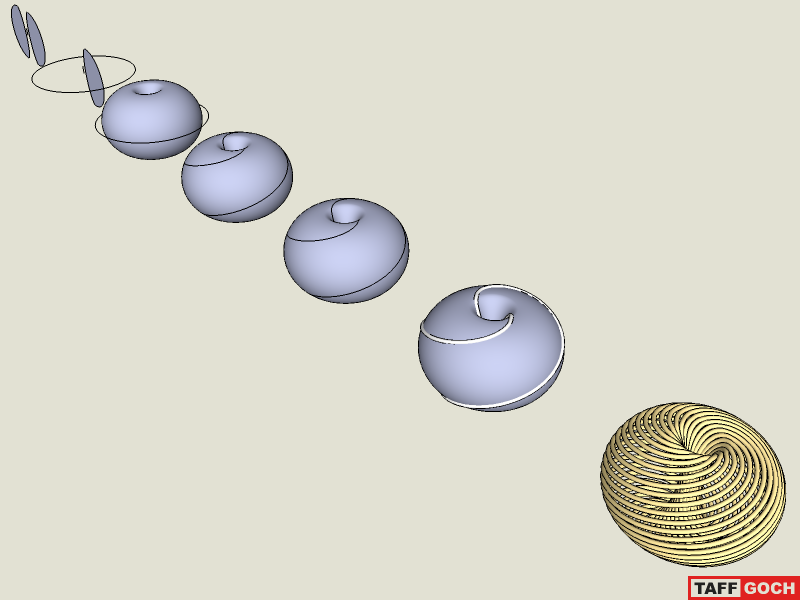
The same technique could be used to precisely match the frequency and repetition of the original posted images, with the right count of torus and circle segments. (I doubt I'll pursue that further, but thought others might be interested in the technique.)Turn on viewing of "hidden geometry," to see how the follow-me path was drawn with the "Line" tool. (Model attached.)
-Taff
-
Hi, guys, try the tours plugin (http://regularpolygon.blogspot.com/2010/07/plugin-torus-10.html)
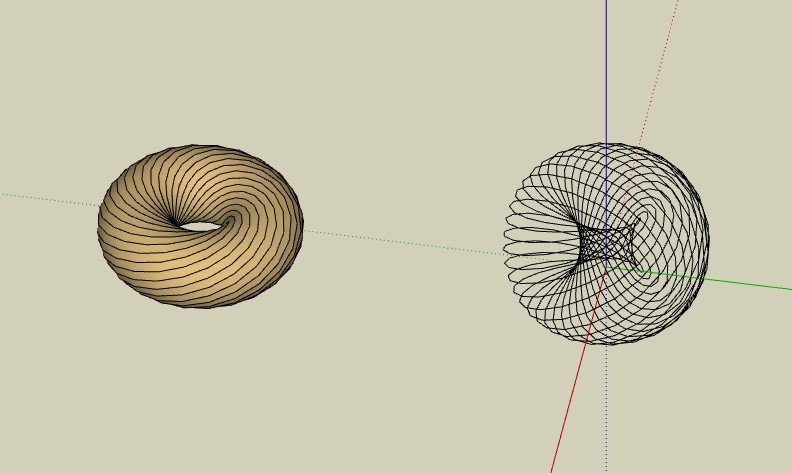
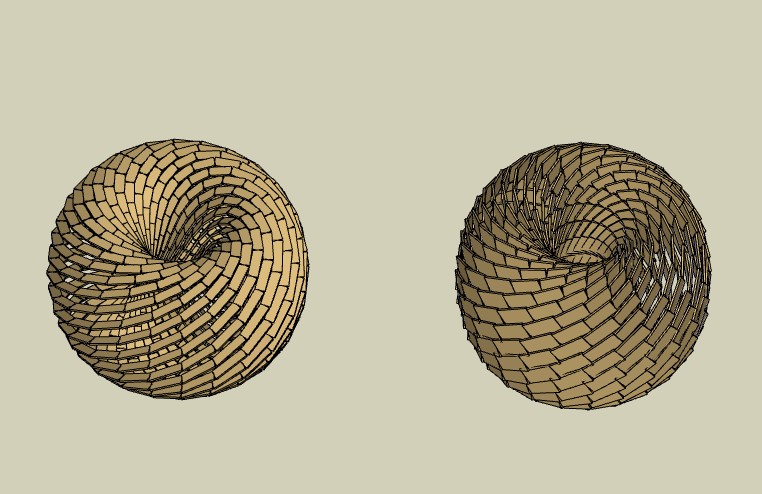
-
@unknownuser said:
It seems to me that you may find an intermediate process to produce a really round shape, am I wrong?
I had not search to have a perfect round form

Maybe it's an hard way because you must play with the Helix parameters!
So maybe not the best trick for this problem
But as said previous you can deform it for approch the Sphere as your just previous post

-
@unknownuser said:
but this is the exercise!
Not for me! Form is secondary!

It was a trick for find the infinite closed path of the helix!
another trichky one : the Boy's surface
 By JPP
By JPP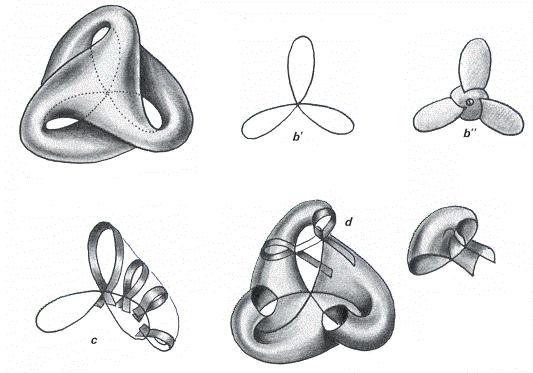


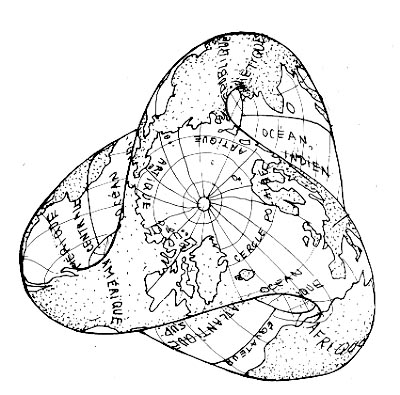
-
It seems to me that you may find an intermediate process to produce a really round shape, am I wrong?
@TaffGoch
It seems to me that we follow about the same method, and the sewing grows easily to a hard polycount
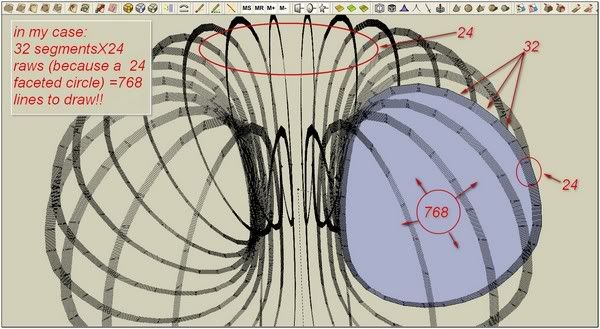
60x60=3600 ! I must be wrong somewhere

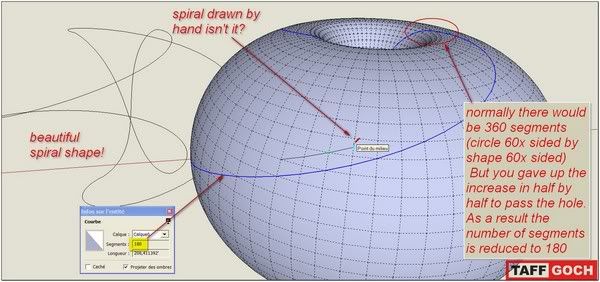
(picture coming from a study of TaffGoch model)@Arc
Thank you to have discovered for us this Regular Polygon's plugin (Hello Regular ! )
)
The torus spiral can be easily rearranged with FredoScale
@Ely
Guy, You can't but come now to show us your way
*s
-
@unknownuser said:
I had not search to have a perfect round form
but this is the exercise!
@unknownuser said:
But as said previous you can deform it for approch the Sphere as your just previous post


@unknownuser said:
60x60=3600 ! I must be wrong somewhere

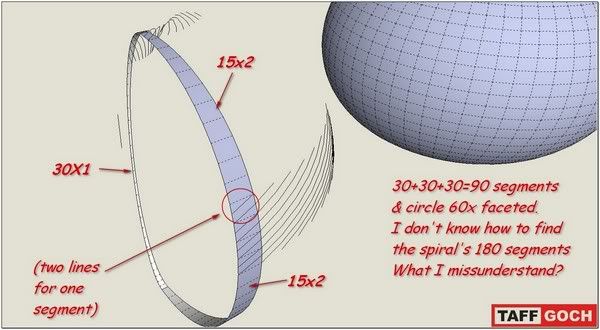
(picture coming from a study of TaffGoch model)I don't understand everything but i get an element of answer:
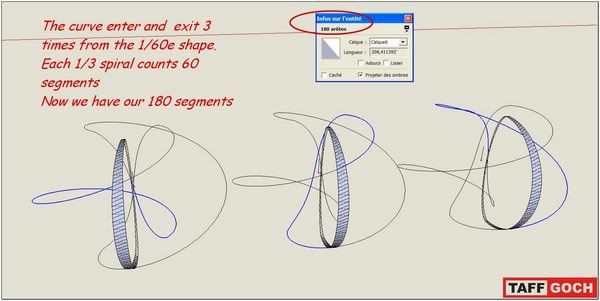
(picture coming from a study of TaffGoch model)*s
-
Dear Pilou,
thanks for this Jean Pierre Petit's link.
(When I was young, I was a wild and rebel, and bad student. I don't know why I want to understand everything like I do by now)


First a trick concerning a problem I have met: When I wanted to reconstruct the complex set of spirals by copy/rotate the basic section, that produced here and there some micro-cuts in the continuity of the lines.
I have used StrayLines to locate and label them
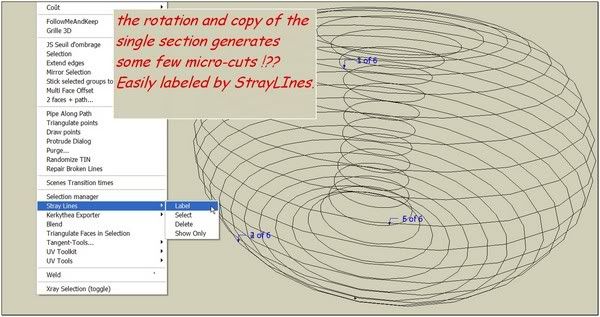
Repair,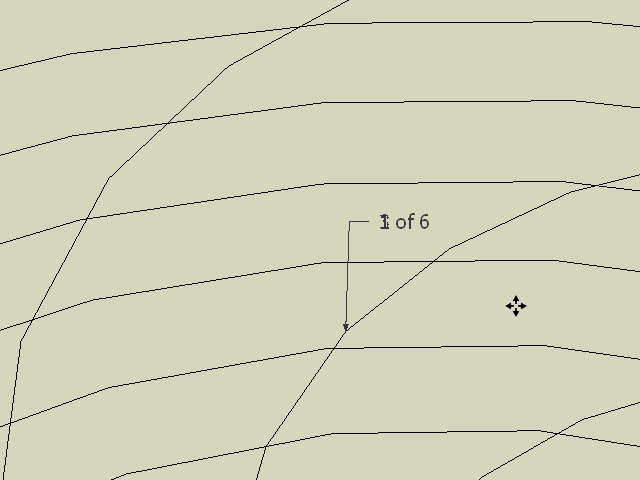
>I want to understand better how the spiral works:
1)taking back my model
24 sided circle; 32 segmented face shape; each segment is 24 subdivided.
Each 360° turn of the shape describes completely one of the 32 face's segments.
24 single edges are necessary to achieve this single revolution.Consequently, the entire spiral is made by 32 turns and no edge is used two times.
and we find effectively 32X24=768 edges
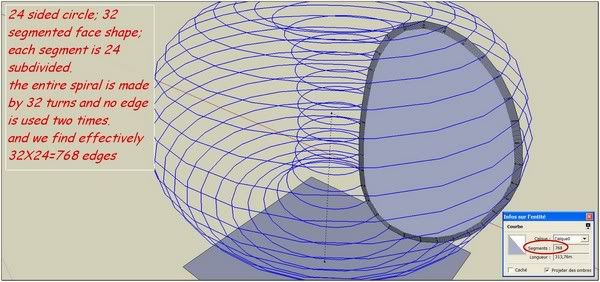
1)taking back Taff's model
Each 360° turn of the shape uses 60 edges (because of the 60 sided based circle).
The entire spiral needs 3 complete turns of the shape to be totally described.
3X60= 180 edges of the spiral.
Each edge of the basic section (90 edges) is used two times.
2X90= 180 edges of the spiral.
As I can understand the law of this:
- the shape must make a number of entire 360° turns
- the complet set of edges(included into the basic section) must be used a complete number of times.
- the number of edges used in the number of complete turns must meet the number of edges constituting the basic section used to produce the spiral.
here: 60X3=180=90x2
 simon
simon -
I believe that is the same problem for what Tig had made his True Tangents plug
Circles or helix ar not real circle, just polysegments aproximation , so in the 3D space there are some losses of precision after some turns
I have remarked that with my previous try above, I had must corrected by hand the join continuity!


-
Hmm so much theory ..what i did was simple,make a spring,make a copy of it,take a spring and adjust it with ffd(remember to let the top and bottom points untouched) in order to make from it the inside part of the spiral, after this take the other one and flip it along in order to continue(descend on the outside) the first one,then play with ffd on it in order to make the exterior part of the spiral(remember to let the top and the bottom points untouched).Then i used lines to tube plugin. And that s kind of it!
Ah..and before working them with ffd i flattened(with ffd) the top and bottom spires of the springs to make a smooth transition from a spire to another.
-
Colors help identify the six separate (yet identical) loop components:
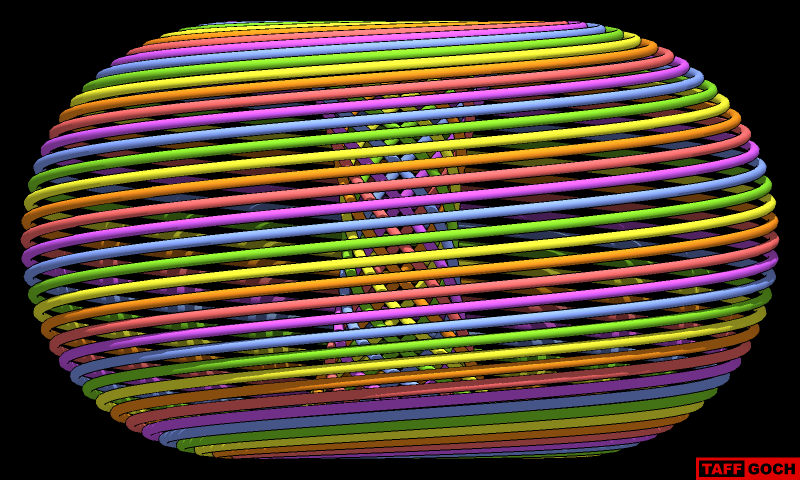
-Taff
-
@Ely,
Hi Ely, I like your way: searching for simple and quick processes
 your solutions are refreshing
your solutions are refreshing 
SketchyFFD (Free Form Deformation) is a good deal for sure

[Plugin] SketchyFFD (Updated Aug 22, 2009) by CPhillips
SketchyFFD (Updated 9 Feb 2010) revisited by gbabcock
Making springs:
How to make spiral 02 by SketchUp
SketchUp: KitoRaupp_Pottery
(May be you can do a little more effort to explain in few several steps in your Skp rather than just show the result )
)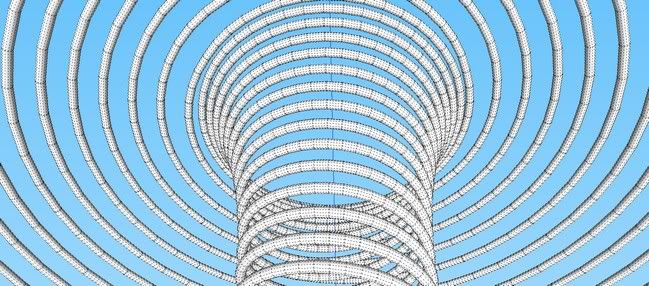

Hi Taff (I have noticed you are from the early morning, and I'm waiting my own awakening to read your posts
 ) Thank you for your colored exemples. I guess the same treatment as you've done with your Geodesic Weave Ball should be also very great
) Thank you for your colored exemples. I guess the same treatment as you've done with your Geodesic Weave Ball should be also very great 
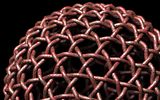
Additionally, I would invite people to visit carefully your warehouse collections they are mines



 simon
simon
re: what a great thread!! -
More torus segments produce results that better approximate the original images.
(Well, duh!)
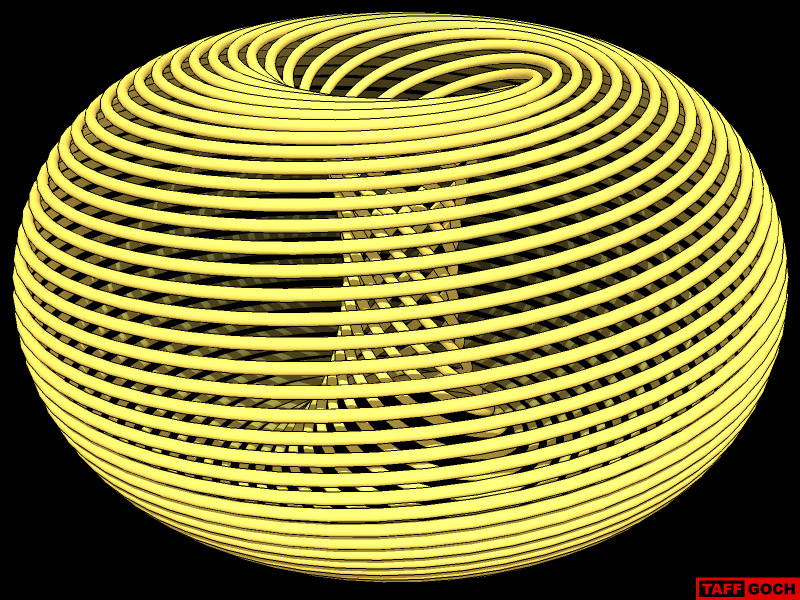
Model available at 3D Warehouse-Taff
-
Simon,
I tried the chipped-paint texture, but it was too "busy," and was a visual distraction.
A simple texture looks good though, when rendered:
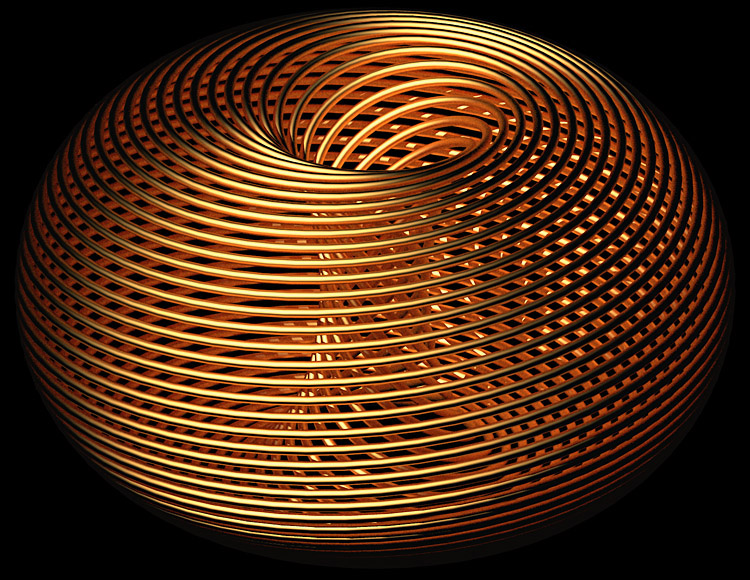
-Taff -
Dear Taff,
Simple is the best; it is a "réussite" . I see it in 2D, spirit relaxing.
(But is it so simple? I mean about the discrete raw of light)'Cause you seem also from late in the night, I wish U a good one.
 simon
simon
Advertisement
